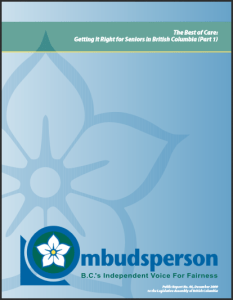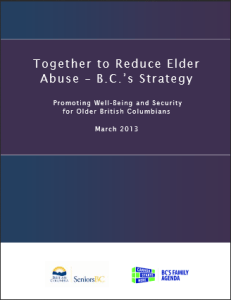In June 2013, BC Ombudsperson Kim Carter released her 2012/13 Annual Report. In addition to a number of other matters, the Annual Report directly addresses seniors and continuing care issues. This summary prepared by the BC Care Providers Association provides a brief overview of these issues, followed by a more detailed discussion.

_________________________________
Overview
1. Update: The Best Of Care, Getting it Right for Seniors in British Columbia, Parts 1 and 2
The Annual Report provides updates on actions by government regarding the 176 recommendations made in the Ombudsperson’s systemic report on seniors care, The Best Of Care, Getting it Right for Seniors in British Columbia, Parts 1 and 2.
2. Update: On Short Notice: An Investigation of Vancouver Island Health Authority’s Process for Closing Cowichan Lodge
In 2012, the Ombudsperson found that VIHA acted unfairly by not following the appropriate process in seeking to close Cowichan Lodge, a long established residential care home. The Annual Report provides updates on VIHA’s progress toward meeting the Ombudsperson’s recommendations.
3. Update: Honouring Commitments: An Investigation of Fraser Health Authority’s Transfer of Seniors from Temporarily Funded Residential Care Beds
In 2012, the Ombudsperson found that the Fraser Health Authority acted unfairly when it decided to move residents out of temporarily funded beds, after it had already advised the residents in writing that they would not have to move from the care home. The Annual Report provides updates on Fraser Health’s progress toward meeting the Ombudsperson’s recommendations.
4. New Report: No Longer Your Decision: British Columbia’s Process for Appointing the Public Guardian and Trustee to Manage the Financial Affairs of Incapable Adults
In February 2013, the Ombudsperson’s Systemic Investigation Team delivered a new report to the Legislative Assembly regarding BC’s process for appointing the Public Guardian and Trustee (PGT) to manage the financial affairs of incapable adults.
5. Resolved: Complaints
The Annual Report summarizes a number of complaints that were resolved in 2012/13, including some that involve seniors’ health and/or residential care issues.
_________________________________
Detailed Discussion
1. Update: The Best Of Care, Getting it Right for Seniors in British Columbia, Parts 1 and 2
In The Best Of Care, Getting it Right for Seniors in British Columbia, Parts 1 and 2, the Ombudsperson made 176 recommendations to the Ministry of Health (the Ministry) and regional health authorities designed to improve home and community care, home support, assisted living and residential care services for seniors. The majority of recommendations were aimed at the Ministry; however, as the Ombudsperson notes in the Annual Report, the Ministry has not yet indicated whether it has accepted the recommendations. In any event, the Ombudsperson asked the Ministry and health authorities to report on the progress made in implementing the recommendations.
recommendations were aimed at the Ministry; however, as the Ombudsperson notes in the Annual Report, the Ministry has not yet indicated whether it has accepted the recommendations. In any event, the Ombudsperson asked the Ministry and health authorities to report on the progress made in implementing the recommendations.
For a number of recommendations, the Ministry and health authorities have provided no specific response; however, the Ombudsperson does note at pp. 53-54 that the Ministry and health authorities have made the following progress:
- The Ministry has revised the Home and Community Care (HCC) Policy Manual to require health authorities to process an application for temporary rate reduction within 30 business days of the date the health authority receives complete supporting documentation.
- The Ministry has amended its HCC Policy Manual to require that health authorities, when delivering services, require that staff report possible abuse and neglect.
- Northern Health enhanced the “compliments and complaints” section of its website by including information about how a member of the public can raise a concern about health or safety issues for assisted living clients.
- Information about substantiated assisted living complaints has been available through the Ministry’s website since September 1, 2012 and the list of serious incidents that must be reported to the Assisted Living Registry has been expanded to include missing persons, a police call and flood causing personal injury or building damage.
- All health authorities provide online access to summary inspection reports for Hospital Act facilities.
- The Ministry has completed its review of the use of anti-psychotic drugs in residential care homes. Following on this review, the Ministry released best practice guidelines for accommodating and managing the behavioural and psychological symptoms of dementia in residential care in October 2012. In March 2013, the Ministry approved a training program that will be used as part of dementia care training to residential care providers in the province.
- The Ministry released a Provincial End-of-Life Care Action Plan for British Columbia in March 2013 to guide planning for integrated primary and community care services, including ensuring end-of-life care choices are respected by health care providers.
- As of March 2013, VIHA, Fraser Health Authority and Interior Health Authority are inspecting Hospital Act facilities using the same criteria as facilities licensed under the Community Care and Assisted Living Act. Fraser Health and Vancouver Island Health are conducting these inspections annually and Interior Health still is in the process of completing its first review of all sites. Both Northern Health and Vancouver have already implemented this recommendation.
Some other updates include:
- Residents’ Bill of Rights. In April 2012, the Ministry implemented a new risk assessment approach and tool to assist licensing officers as they inspect licensed community care facilities to identify the level of risk to persons in care when they observe non-compliance with the Residents’ Bill of Rights. The Ministry aims to have facility risk ratings publicly posted by 2014.
- Residential Care Information. In September 2012, the Ministry updated the SeniorsBC and HCC websites to provide more information about residential care.
- Resident and Family Councils. The Guidelines for the Development of Family Councils are available on the HCC website. The Ministry has not created a position to promote and help develop resident and family councils, as health authorities report twice annually on the status of active councils.
- Patient Care Quality Offices. The Ombudsperson recommended that the Ministry take all necessary steps to ensure that PCQOs can respond to a broader range of complaints, including complaints from resident and family councils, and provide specific direction to the PCQOs on the steps for processing complaints. The Ministry reviewed the patient care quality system and did not identify these as action items.

- Elder Abuse. In March 2013, the Ministry released its elder abuse prevention strategy, in which it committed to increasing the hours and capacity of the Seniors Abuse and Information Line, and to working with health professional colleges and health authorities to ensure frontline staff are aware of resources and mechanisms to report elder abuse.
- Care Aide Registry. In March 2013, the Ministry released its review of the Care Aide Registry and plans to extend the Registry’s mandate to include private sector service providers and employers.
The Ombudsperson has compiled comprehensive tables of the status of each recommendation:
- Ministry of Health (Part 1)
- Ministry of Health (Part 2)
- Fraser Health Authority
- Interior Health Authority
- Northern Health Authority
- Vancouver Coastal Health Authority
- Vancouver Island Health Authority
_________________________________
2. Update: On Short Notice: An Investigation of Vancouver Island Health Authority’s Process for Closing Cowichan Lodge
In 2012, the Ombudsperson found that VIHA acted unfairly by not following the appropriate process in seeking to close Cowichan Lodge, a long established residential care home.
Background
In June 2008, VIHA announced the closure of Cowichan Lodge, a 94-bed residential care home owned and operated by the health authority. At the time, all 94 beds were occupied, including all 72 permanent complex care beds.
The letter announcing the closure was posted at Cowichan Lodge. It was not mailed to residents or family members, nor it did not contain information about a meeting that had been scheduled to discuss the closure with families. Some residents were advised in person of the decision to close, while some family members were contacted by phone after the letter had been posted at the residential care home.
VIHA’s community care licensing office also learned about the decision to close after the letter had been posted. The licensing office then sent VIHA’s residential services section information about the 12-month notice requirement in s. 14(1) of the Adult Care Regulations, as well as the procedure for seeking an exemption.
Another residential care home then opened less than two kilometres from Cowichan Lodge, and per the service agreement, the operator was required to admit residents in collaboration with VIHA and be at capacity 40 days after opening.
VIHA applied for an exemption from the 12 month notice period, and sought to reduce the notice period to three months. VIHA’s CEO made a request for 60 days. As explained in the investigation report, the CEO’s “request indicated that without an exemption the risk to residents’ health and safety would increase exponentially due to problems with staff retention and recruitment at Cowichan Lodge as the closure drew closer.”
VIHA’s Chief Medical Health Officer granted the exemption, permitting Cowichan Lodge to close in 60 days. VIHA did not immediately inform families of their right to appeal the decision to the Community Care and Assisted Living Appeal Board (CCALAB), or that they could request a stay of the decision.
Appeals were filed with the CCALAB, and it granted a stay pending appeal.
As of August 18, 2008, 41 of 94 residents had been transferred to other residential care homes.
Following that, VIHA’s CEO requested a recession of the exemption. This was granted and the 12 month notice period was reinstated. As a result, the CCALAB dismissed the appeal as the health authority was no longer seeking an exemption.
On August 22, 2009, Cowichan Lodge ceased operation as a residential care home. 82 staff were displaced.
Findings and Recommendations
In the investigation report, the Ombudsperson makes a number of findings and recommendations. For example:
- VIHA provided inadequate and confusing information to residents and families about the reasons for the closure. VIHA should develop a publicly available policy that sets out the process it will follow for closing its residential care homes.
- It was unreasonable for VIHA to delay notifying staff for more than three weeks after the VIHA Board approved the decision to close. VIHA’s closure policy should consider the time required to find employment opportunities and the recruitment needs at other homes.
- VIHA did not adequately consider the risks of residents’ health and safety in requesting an exemption to the 12 month notice period. VIHA should develop policy specifying the criteria operators must consider when applying for an exemption.
- VIHA acted improperly by informing residents and families about the closure without requesting an exemption and without making clear that 12 months’ notice was required unless an exemption was granted. VIHA should fulfill its legal obligations to provide 12 months’ notice or seek an exemption in a timely manner.
VIHA expressed regret that the closure was “not managed in an ideal manner.” It accepted all recommendations except one (as it believes it does not have statutory authority to accept it).
As of June 2013, the Ombudsperson reports that VIHA has made progress towards meeting the recommendations. For example, VIHA has developed a policy on permanent and temporary closures of VIHA funded and operated residential care homes.
_________________________________
3. Update: Honouring Commitments: An Investigation of Fraser Health Authority’s Transfer of Seniors from Temporarily Funded Residential Care Beds
In 2012, the Ombudsperson found that the Fraser Health Authority acted unfairly when it decided to move residents out of temporarily funded beds, after it had already advised the residents in writing that they would not have to move from the care home. The investigation also revealed:
… that on occasion Fraser Health had discouraged operators of facilities who were looking at closing facilities with less than 12 months notice from asking for the required exemption from a medical health officer. This meant that affected seniors and families were denied the opportunity to appeal such an exemption to an independent statutory tribunal.
The Ombudsperson reported that she was satisfied with the health authority’s response to the recommendations for improving its planning, transfer and resident care home closure processes. She was also pleased that Fraser Health agreed to apologize to the seniors and their families.
In June 2013, the Ombudsperson reported that FHA has issued 31 letters to former residents apologizing for any distress, and it has implemented the practice of telling operators of licensed residential care facilities to ensure their residents and families are informed of their right to appeal a decision to approve a notice period exemption request.
Detailed updates regarding FHA’s progress toward meeting the recommendations are available on the Ombudsperson’s website.
_________________________________
4. New Report: No Longer Your Decision: British Columbia’s Process for Appointing the Public Guardian and Trustee to Manage the Financial Affairs of Incapable Adults
This 200-page report focused on the process of issuing certificates of incapability that result in the PGT assuming control over an adult’s financial and legal decision-making. This process can happen when adults have not planned ahead (e.g., they have not appointed a power of attorney) or do not have someone to act on their behalf (e.g., they have no close friends or relatives available to make decisions on their behalf).
With the closure of many psychiatric institutions, the use of certificates of incapability has extended beyond hospitals and mental health facilities to adults in residential care and the community. While the landscape has changed, the certificate process has not.
Health authorities routinely issue certificates for residents and clients; however, the process treats these individuals as “patients” under the outdated Patients Property Act. The process does not respect individuals’ procedural rights.
Protective Measures
The PGT has authority to take certain temporary, time-limited actions when it has reason to believe that an adult’s financial affairs are in immediate need for protection. These actions can involve residential care homes. For example, the PGT can take the protective step of directing a bank to pay an adult’s residential care home payments from the adult’s account.
The Ombudsperson reviewed 57 PGT files. On five of these files (9%), the PGT took protective measures, including directing a care home to hold an adult’s residential school settlement cheque and not to provide it to the adult.
Recommendations
The report made 28 recommendations aimed at improving PGT and health authority practice, establishing provincial training for staff, and creating legally binding minimum requirements. One recommendation directly related to residential care:
Adults under statutory guardianship be entitled to have their capability reassessed upon the occurrence of any of the following:
-release from institutional or residential care (regardless of whether they are being fully discharged)
-discharge from residential care, or
-completion of extended leave under the Mental Health Act.
_________________________________
5. Resolved: Complaints
The Annual Report summarizes a number of complaints that were resolved in 2012/13. Below are five summaries involving seniors’ health and/or residential care issues.
MSP coverage for a father: a daughter’s concerns | Health Insurance BC – MSP, Ministry of Health | Vancouver Island / Sunshine Coast
M’s father lives in a seniors’ care home and suffers from dementia. M has power of attorney for her father. He had moved back to BC from Ontario in September 2012. M had sent in her father’s MSP application and assumed coverage would begin in December 2012. But when he required medical treatment in January 2013, it was discovered that his MSP coverage had not been put in place. M spoke with MSP staff, but did not feel she received adequate information. She did not understand why someone from HIBC-MSP had not contacted her regarding problems with her father’s MSP application.
The Ombudsperson Office called HIBC-MSP and asked if someone could call M to answer her questions about the process. HIBC-MSP contacted M and explained what needed to be done to arrange medical coverage for her father.
Helpful information for an advocate | Residential Tenancy Branch | The Interior
N was advocating for some seniors and was having difficulty getting information about how to dispute a rent increase for seniors living in apartments run by a society. She contacted the Residential Tenancy Branch (RTB) and BC Housing, but was unclear about which authority was responsible for the rate increase.
The Ombudsperson Office contacted the RTB and asked if someone could call N to provide her with information. The RTB contacted N and provided her with information about the RTB dispute resolution process and the fee waiver application.
Concerned about the rate | Interior Health Authority | The Interior
J’s father lives in a senior living special care home. J said the rate his father is required to pay for care is too high and that the fees do not leave enough income to cover his mother’s living expenses. J was having difficulties reaching a person at the Interior Health Authority (IHA).
The Ombudsperson Office contacted the IHA and asked that someone contact J. The IHA contacted J and said IHA would review his father’s financial documents to determine if he was eligible for further financial assistance.
Early resolution process has teeth | Vancouver Island Health Authority | Vancouver Island / Sunshine Coast
C called the Ombudsperson Office on behalf of her elderly father, a patient at Nanaimo Regional Hospital. Her father suffered from delirium and pneumonia, and had lost his lower denture during a move from one floor of the hospital to another. The denture had not been located and the hospital manager who was to call C had not done so. C wanted her father’s teeth found or to make an insurance claim for replacement.
The Ombudsperson Office contacted the medical unit’s https://bccare.ca/wp-content/uploads/2022/08/medcare-img22.jpgistrative assistant, who offered to follow-up with the manager. The manager called C soon after and the hospital agreed to reimburse her for replacement of the dentures.
Staying safe | Fraser Health Authority | The Lower Mainland
M was worried about the length of time it was taking the Fraser Health Authority to find an appropriate residential care home for her son. He lived alone and was at risk of serious injury. His wheelchair did not fit through his bathroom door, so he had to leave it outside the bathroom. He often fell and was unable to get up on his own. He received home support services three times daily, but sometimes this was not enough.
The Ombudsperson Office investigated whether Fraser Health Authority was following a reasonable procedure in responding to the request for residential placement. His case manager confirmed that his need for residential care was urgent, but placement was complicated because he had selected preference in two geographic areas whereas policy limited preference to one area.
Given the urgency, interim measures were explored and the health authority agreed to increase his home support hours so that one or two home support workers were with him from 8 am to 8 pm.
_________________________________
The Ombudsperson is British Columbia’s independent voice for fairness. She is an independent Officer of the Legislature, appointed pursuant to the Ombudsperson Act. More information about what she can investigate is available on the Ombudsperson website.
– This summary was prepared by the BC Care Providers Association






